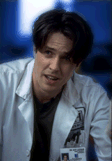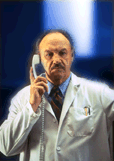Extreme Measures
 It is rare these days to see a moral thriller, so we should be grateful that Extreme Measures relies for at least some of its drama on the tension of ideas. Seven, last year's dark thriller, made a stab at moral depth, but relied on the stock pyschopath to move the action along. Even so, what made Seven a great film was that it made hero and audience square up to a moral argument and - incredibly for Hollywood - lose it.
It is rare these days to see a moral thriller, so we should be grateful that Extreme Measures relies for at least some of its drama on the tension of ideas. Seven, last year's dark thriller, made a stab at moral depth, but relied on the stock pyschopath to move the action along. Even so, what made Seven a great film was that it made hero and audience square up to a moral argument and - incredibly for Hollywood - lose it. Extreme Measures is made of more conventional stuff, but its redeeming feature is an absence of conventional villains. The nearest thing we have is the eminent neurologist, played by Gene Hackman, who has the distinction of being a serial killer with a good cause. The hero, Hugh Grant, is a bright young doctor who, among other achievements, appears to have cured himself of the awkward public school comic affability that threatened to turn him into the sort of actor that plays comedy so light he could float away without anyone caring.
In Extreme Measures the faltering Grant has been transplanted by an altogether more decisive variety as adept at resolving moral dilemmas as surgical ones. We first see him called upon to decide which of two patients will get the only operating theatre in a busy New York hospital. One is a crack dealer, the other the cop the dealer has just shot. Grant plumps for the cop and we're left in no doubt that this is not purely a medical judgement, though the scene is sufficiently skillfully handled that it avoids triteness.
A few scenes later Grant's character is faced with a patient undergoing the metabolic equivalent of Chernobyl and his subsquent efforts to discover what killed the patient draw him swiftly into a dark and dangerous conspiracy at the centre of which is Hackman, who is using New York's down-and-outs as human guineau pigs to in a clandestine research campaign to find a cure for disabling conditions. Before the showdown, which involves the exchange of rapid-fire moral imperatives as well as a few bullets, the film treats us to some of the more conventional elements of the thriller genre including a high-tension pursuit in the bowels of the city and several twists of the good guy turns out to be bad guy and vice versa variety. The grisly bits are effective without being too graphic. Top marks to the director for resisting the tempation to supply what the imagination does so much better.

In a final scene which is too obviously an epilogue, the makers of Extreme Measures try to bring the moral debate back to life but by this time it's as dead as Gene Hackman's wayward genius. Meanwhile, good doctor Grant's moral rectitude, which only wavers once during the film's 100 miutes, is as strong and healthy as ever.
Extreme Measures is a good film but it might have been more convincing if the audience had emerged from the theatre in a little more discomfort.
Reviewed by Julian Patterson
FILM FACTS IN BRIEF
Written by Tony Gilroy, directed by Michael Apted and produced by Elizabeth Hurley
Starring Hugh Grant, Gene Hackman, Sarah Jessica Parker
Go to the official site for more information
Or see what the Internet Movie Database has to say